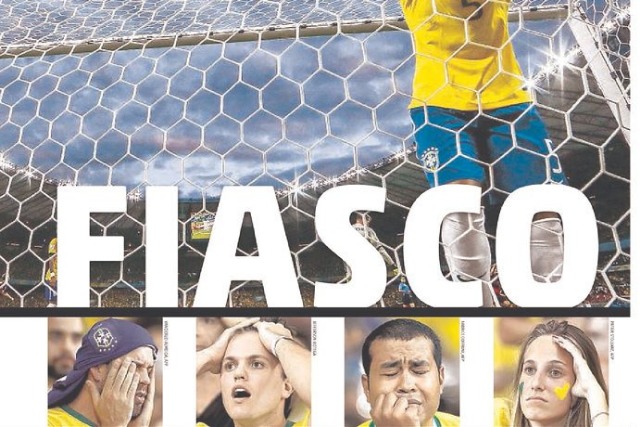Brazil has just drawn a close to its hosting of the World Cup. On the ground, the tournament has been a success, due to the incredible hospitality of the ordinary, ticketless Brazilians who embraced visitors with open arms, despite the incredible corruption and overspending that characterised the buildup to the event.
However, in football terms it was a disaster for the home nation.
After the humiliating defeat to eventual champions, Germany, one newspaper ran a front page that said it was too embarrassed to print a cover – "Back tomorrow", it said.
Another, highlighting the traumatic place the game will inevitably take in local history, lead with an ironic headline "Congratulations", alongside a photo of the 1950 team that surprisingly lost to Uruguay in the only previous final to take place on home soil. The headline claimed that the runners-up in 1950 could be forgiven now, as the nation now knows what "real shame" feels like.
In local restaurants and bars, ads featuring references to a sixth title are met with angry rebukes or straight-out ridicule.
It is difficult to underestimate the importance of football to Brazilian psyche. The five-time champions have held the romantic label of the "nation of football", with the national team playing in a distinctive style that typically usurped the planning and strategy of other pretenders to the throne. The last title Brazil won in 2002, coached by Felipe Scolari, was an example of this Brazilian style.
However, the shattering defeat to Germany has not only destroyed the nation’s dreams for a sixth title, but has also debunked the myth of the superiority of the "Brazilian way of playing" in the era of hyper-professionalism.
In local restaurants and bars, ads featuring references to a sixth title are met with angry rebukes or straight-out ridicule. The nation is feeling devastated in the aftermath of such an unexpected failure, experiencing as many describe it here "a massive hangover". The post-World Cup landscape for brands is a tricky one.
Here are four considerations for those you want to get it right with Brazilian consumers post party.
Brazilian sport beyond football
The beautiful game is not so beautiful, in the nation that made it beautiful. No player has emerged unstained, even Neymar, who missed the final humiliation. Representing your brand through football directly is simply off the table for a long while.
The 2016 Olympic Games in Rio offer brands an opportunity to get behind a new series of Brazilian heroes. In London, Brazilian athletes produced a series of historic achievements in new sports such as gymnastics, judo, swimming and pentathlon.
Another tactic, as demonstrated by Coca Cola is to highlight the resilience of Brazilians to disappointment. The new spot by the beverage brand is presented from the perspective of a grandfather who remembers the sadness of listening to the loss of the 1950 World Cup on radio, but highlights that he enjoyed many more successes for Brazil through his life, in the company of his children and grandchildren.
Be wary of politics
In the face of the humiliating failure of the Brazilian team, attention will quickly turn to the financial excesses of the buildup and the country’s October presidential election.
The behaviour of incumbent president Dilma Rousseff in the past week has been indicative of this tension. Immediately after the defeat to Germany, Dilma made attempts to distance the government from the World Cup, but was seen participating in an odd game of hot potato to present the trophy to German captain Philipp Lahm after the final.
Brands need to aware of the collective desire for change. The World Cup has highlighted serious flaws in the Brazilian political and social system, and Brazilian coach Felipe Scolari, who resigned this week, ignited this sentiment by accepting no blame for the defeat, seemingly mimicking the press arrogance of corrupt politicians.
Simply put, brands must tell stories of a new Brazil that is transcending old habits and is entering a new period of transparency and modernity. Extra investment in the right corporate responsibility programs focused on education and health will be very welcome with local consumers.
Help sell Brazil to the world next time
The World Cup has served a huge wake up call to Brazil in terms of how to host a huge global event.
Due to disorganisation at official level, little effort was made to use the World Cup as a vehicle to present Brazilian culture to the world. For example, Sao Paulo, the nation’s largest city, failed to have a supporting tourist campaign during the event.
Locals were appalled by the low quality and absence of Brazilian flare in the opening ceremony, ridiculing the organisers on social media. With just two years to the Rio Olympics, it feels that Brazilian are determined to get it right next time, presenting their culture and most symbolic city to world in all its glory.
This creates an ideal space for brands to create a connection with local sentiment. Brazilians reveled in the experience of hosting the world the first time; they will be looking forward to welcoming the world back again once again.
Communicating in this area also fits well with the ambitious nation looking forward. Football is complicatedly tangled with Brazil’s past, while the Olympics speak to a younger, outward-looking nation.


